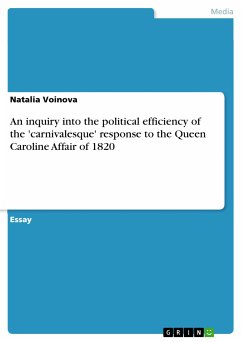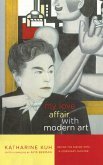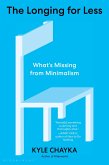Essay from the year 2011 in the subject Art - History of Art, grade: 1, University College London, language: English, abstract: Britain was undergoing some important changes. Following the Manchester Peterloo Massacre of 1819 the government introduced the so-called Six Acts which prohibited congregation of more than fifty persons on matters regarding the state without permission, accelerated the speed of prosecution for libel, and put further restriction newspaper publications.1 By 1824 the act was partially revoked, and 1832 marked the long-awaited Reform Act, which enfranchised more men and revised representation from newer boroughs. In this light the Queen Caroline Affair of 1820 provided the occasion for effective public ridicule of the oppression under the guise of carnivalesque conviviality and caricature. This movement of the working class from subjects to citizens through their engagement with fearless carnivalesque subversions of the established system using the wronged Queen Caroline as the icon of mistreatment by the government will be the main focus of this essay. The affair at its core is not more than a domestic quarrel between George IV, and his unwanted wife, Caroline of Brunswick. In 1795, the king ended his illicit marriage to Maria Anne Fitzherbert in order to marry a more noble Caroline, the arrangement was one of convenience for George IV, as the Parliament promised to pay off his substantial debt if the notorious dandy agreed to live a more subdued life with his new wife. The marriage was doomed from the beginning when George IV humiliated Caroline before she even met him when he sent his new mistress Lady Jersey to be her lady-in-waiting.2 Shortly after the wedding, with Caroline pregnant, they separated and Caroline lived apart from the court. Already by 1807 George IV was attempting to rid himself of his homely wife by launching a 'Delicate Investigation' on the grounds of a rumor that Caroline's adopted son was actually her bastard. The investigation concluded that although some of her behaviour is indiscrete there are no grounds for divorce.3 Despite her proven innocence, she was ostracized at court, excluded from attending important state events, and after a series of humiliations and restrictions on seeing her daughter, Princess Caroline chose to go abroad in 1814.4 After the death of George III, Caroline elected to return to Britain to claim her rightful place as the Queen beside George IV, however this proved to be difficult, and this is where the Affair begins.5
Dieser Download kann aus rechtlichen Gründen nur mit Rechnungsadresse in A, B, BG, CY, CZ, D, DK, EW, E, FIN, F, GR, HR, H, IRL, I, LT, L, LR, M, NL, PL, P, R, S, SLO, SK ausgeliefert werden.









